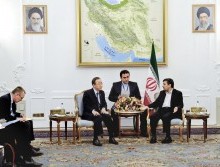
The international community took a step toward renewing significant international sanctions on Iran over the Islamic Republic’s nuclear program last week, even as Iran is continuing to make substantial progress toward nuclear weapons. The Institute for Science and International Security (ISIS) reported on Thursday that Iran is capable of enriching enough weapons-grade uranium needed for a nuclear weapon in just one week and almost 10 nuclear weapons in one month—so it’s unclear if the slow and methodical global condemnation of Iran will be enough to prevent Iran from crossing the nuclear threshold.
The latest step by those concerned about Iran came via the Board of Governors of the International Atomic Energy Agency (IAEA), who last Thursday issued a resolution against Iran over the latter’s failure to clarify suspicious nuclear activities. While the IAEA’s resolution was focused on certain locations where Iran may have had historical concerning nuclear activities, perhaps the greater concern is actually Iran’s current nuclear fuel stockpile—which continues to grow. In a series of posts to X (formerly Twitter), ISIS President David Albright, commenting on the Institute’s report, said the Islamic Republic could produce enough weapons-grade uranium (WGU) in “about one week or less.”
The ISIS report, which was published the same day as the IAEA resolution, painted a dire picture of how close Iran is to producing the fuel for a number of nuclear weapons. Wrote Albright in the posts: “Based on the new IAEA quarterly report, Iran’s breakout timelines to make WGU are now shorter than in August. It can now make enough WGU, taken as 25 kg per weapon, for almost ten nuclear weapons in one month, 13 in two months, 14 in three months, 15 in four months, and 16 in five months.”
While Iran has made crucial progress towards the nuclear fuel needed for weapons, they still need to develop the capability of setting off a nuclear explosion before it can fully weaponize the enriched uranium. With Iran’s progress in the background, the IAEA took the next step towards discouraging Iran from continuing on the weapons path by issuing their second anti-Iran resolution in six months. The United States and so-called E3 (Germany, United Kingdom, and France) welcomed the move.
In a joint statement, the US and E3 said the IAEA resolution “responds to Iran’s continued failure to provide the IAEA the information and cooperation needed to clarify long outstanding issues relating to undeclared nuclear material detected at multiple locations in Iran. These issues are central to the Agency’s ability to provide assurance of the exclusively peaceful nature of Iran’s nuclear programme.”
Part of the resolution requires IAEA Director General Rafael Grossi to provide a “comprehensive and updated assessment” on outstanding questions involving Iran’s nuclear program—including on any nuclear material Iran has used for covert activities—no later than Spring 2025.
Said the US and European statement, “It will be important that the Board remain engaged to meet the challenge that Iran’s continued refusal to meet its [nuclear obligations]… would present, including to the credibility of the global IAEA safeguards regime.”
As for how the West could address continued Iranian refusal to cooperate, Sima Shine, head of the Iran and the Shiite Axis program at Israel’s Institute for National Security Studies (INSS), said they could reinstate all the nuclear-related sanctions on Iran removed as part of the 2015 nuclear deal—the so-called “snap-back” procedure.
The INSS posted to X Shine’s analysis that the Spring 2025 IAEA report on Iran “could potentially lead to a referral to the UN Security Council, paving the way to declare Iran’s non-compliance and trigger the snap-back mechanism—the reinstatement of UN Security Council sanctions set to expire in October 2025.”
The prospect of renewed sanctions on Iran also comes as one of Iran’s harshest critics returns to power in US President Donald Trump. Andrea Stricker, Nonproliferation and Biodefense Program Deputy Director and Research Fellow at the Foundation for Defense of Democracies, commenting on X about on her recent report on Iran, said of last week’s IAEA resolution, “In pursuing censure, the E3 are likely preparing for an incoming Trump administration committed to restoring penalties and maximum economic pressure against Iran for broader malign activities.”
In the meantime, Iran’s response to the resolution was more of the same: Iran’s PressTV reported that Iran activated new and advanced centrifuges used for enriching uranium for nuclear fuel. In their joint statement, the US and E3 noted this development with “serious concern… that, instead of responding to the resolution with cooperation, [Iran] plans to respond with further expansion of its nuclear programme in ways that have no credible peaceful rationale.
“We expect Iran to reengage on the path of dialogue and cooperation with the [IAEA}.”
(By Joshua Spurlock, www.themideastupdate.com, November 24, 2024)
